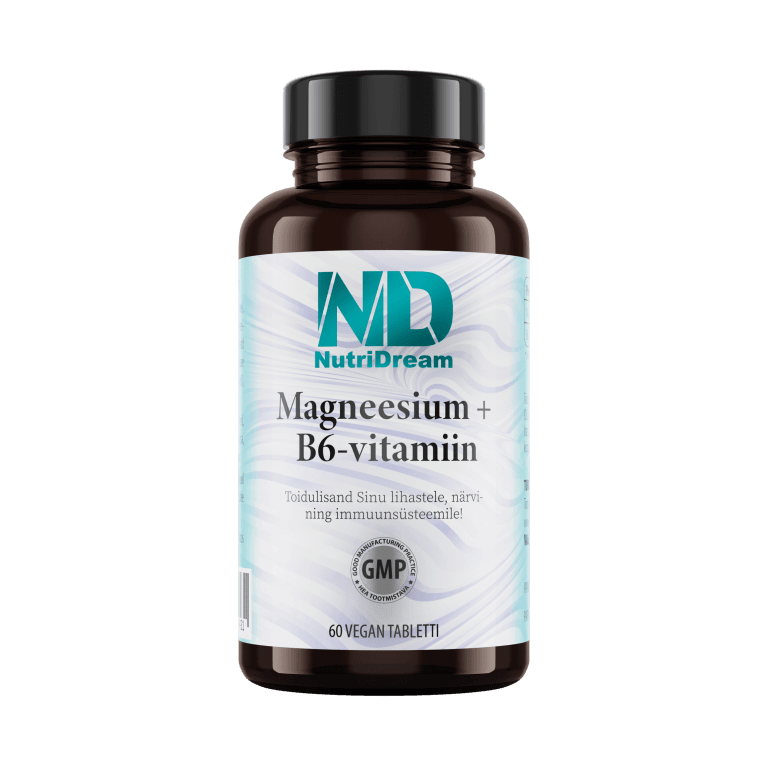Fatigue, muscle cramps and longer recovery time from exercise may be signs of magnesium deficiency
We often feel tired and exhausted after a long winter. We asked nutritionist and trainer Kendra Vaino what could be the cause of this and what we can do about it ourselves.
In one of our earlier interviews, you introduced your activities in the fields of nutrition and exercise. How have you been doing in the meantime during the difficult restrictions that have been imposed on training?
Group sessions couldn't be hosted from the middle of December to the end of January – it was almost like a vacation. It was an interesting experience for me because I have been resting only whilst traveling for the last ten years. I have kept fit by going to the gym and doing my concept classes with home exercise equipment. I have also actively gone skiing and skating. In order for my physique to not disappear as the load has decreased, the diet also changed by itself. I noticed that I feel good at home with only two meals and one snack a day.
I did not do any personal training classes in the meantime. However, larger training junkies have wanted to train a few times a week under my guidance. I was able to continue with the appointments at the Weight Surgery and Nutrition Therapy Centers even during the pandemic-related restrictions.

What kinds of problems do You often see as a nutritionist?
I see the most nutritional problems caused by the large proportion of ready-made meals on the menu. In this case, the nutritional analysis shows the over-consumption of saturated fatty acids, so-called animal fats, the lack of vegetables in the menu and, consequently, the lack of vitamins and minerals. Vitamin B and D are often consumed less than normal. Prolonged over-consumption of sugary foods is also a problem, which can lead to a lack of magnesium and other minerals in the body. Unfortunately, it is difficult to detect magnesium deficiency with a regular blood test, as only 1% of the magnesium in the whole body is in the bloodstream and the remaining 99% in the bones and muscle cells.
Why is magnesium important to the human body?
Magnesium is involved in the work of more than 300 enzymes in our body. It regulates a number of biochemical and physiological processes: metabolism, energy production, nerve function, bone structure, muscle relaxation, including the regulation of myocardial function.
Magnesium deficiency is indicated by fatigue, nervousness, muscle cramps and a longer recovery time from exercise. Those whose diets are high in fat, such as those on ketogenic diets, may also suffer.
Generally, a balanced diet meets the need for magnesium. However, there are diseases and medicines that can prevent the body from absorbing magnesium.

What do you recommend for when someone feels tired and fatigued?
In particular, I would recommend that you rest and review your diet and, if necessary, consult a nutritionist. It is important to have a good night's sleep, a temporary reduction in the training load can also help.
Magnesium-rich foods can help combat fatigue. For example, magnesium deficiency can be indicated by an irresistible craving for chocolate. The main component of chocolate, cocoa, is high in magnesium, which is why it is recommended to consume dark chocolate with a high cocoa content.
Magnesium deficiency also affects the function of neurotransmitters. These are important biochemicals that calm the brain and promote relaxation. The aid may be fortified with B vitamins from magnesium food supplement.
By spring, our energy levels often drop. How to overcome this and face the spring energetically?
I recommend eating wholesome and as little processed food as possible, which is rich in vitamins and minerals. Monitoring the ratio of fats, carbohydrates and proteins in the menu alone does not mean a balanced diet. Nutrient diversity is also important. Magnesium-rich foods, such as raw buckwheat, seeds, nuts, and green vegetables and vegetables, are preferred for relieving spring fatigue.
Nowadays, it is not worth forgetting to support immunity. To do this, you should add more to your menu Vitamin C. An interesting fact is that red bell peppers, for example, have over three times more vitamin C per 100 grams than oranges do. If you have any nutritional questions or problems, feel free to contact me.
This year we had a rare snowy winter – enjoy the fresh winter air and practice winter sports!
Source: an interview from NutriDream toitumisterapeuti ja treeneri Kendra Vainoga




